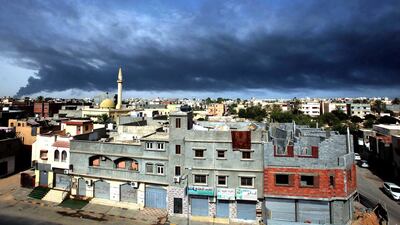When a UAE business delegation visited Libya in January 2012 the country appeared ripe for investment.
The visitors discussed the opportunities to be had in the divergent fields of ports, oil and gas and minerals.
They faced potential competition from investors from Qatar, Turkey, France and the United Kingdom, among others, who were also descending en masse upon the newly liberated country.
More than two years later, the prospect for Libya of any investment from abroad appears a distant hope. Instead, countries including Turkey and the UK have been scrambling to clear out their diplomatic staff as violence between armed groups intensifies in recent months.
The turnaround is a reflection of how far Libya has fallen since the wave of optimism arising from the removal of the long-ruling dictator Muammar Qaddafi in 2011.
More than 200 people have been killed and nearly 1,000 hospitalised in the latest round of fighting. But as well as the heavy human burden, the bloodletting is also taking a huge economic cost.
Oil production has slipped to 500,000 barrels per day, about a third of that pumped before the fall of the Muammar Qaddafi regime. Rebels have repeatedly targeted oil production and export facilities, at one stage blockading oil ports.
Last month, oil production touched 600,000 barrels per day after the end of protests by a local ethic group led to the reopening of Sharara, the country’s largest field. But the gains have proven short-lived. As recently as last week, fighting for control of the airport in Tripoli triggered a blaze at a storage facility holding 90 million litres of oil. Capacity to raise crude output has also been hit by the evacuation of foreign workers from oil companies including Total, Eni and Repsol.
With oil representing as much as two-thirds of GDP and 96 per cent of exports, the disruption to crude supplies has choked a major artery to the economy. GDP collapsed by almost 10 per cent last year and is expected to dip again this year.
The chaos has also dimmed the prospect of Libya following in the footsteps of the UAE in moving to diversify its economy away from oil. That was the hope expressed by Libyan officials in January 2012 when the 100-member business delegation headed by Dr Anwar Gargash, the UAE Minister of State for Foreign Affairs, arrived in the country.
After an eight-month civil war, Qaddafi was gone and oil output was rebounding. The launch of Etihad Airways flights to the capital was to be a catalyst for ferrying more business travellers between the countries. Companies including DP World and Al Ghurair Group were among those assessing investment opportunities.
Much of that investment hinged on the prospect of reform, including the easing of government controls on ports and other infrastructure. But most of all it required political stability.
Reform has been lacking. And as events of recent weeks have visibly demonstrated, stability is a commodity that the government has been unable to guarantee. Tripoli International Airport, the main access point to Libya for foreigners, has become a battleground, prompting Etihad and other international carriers to suspend flights.
Government efforts to secure stability within the political arena by bringing together warring factions have proven tricky. The parliament’s election of Ahmed Maiteeq in May was last month ruled unconstitutional by the supreme court, throwing the government into fresh uncertainty.
On the economic front, it has proven just as challenging. After 40 years of seeing little in the way of trickle down from the oil wealth, the interim government in 2012 responded to people’s demands for better living standards by pouring surging oil revenue into higher wages, subsidies and other ways of transferring wealth to the people. Such outlays have become increasingly difficult to sustain as oil output has stuttered.
In the absence of sustained oil receipts, the government is relying on its foreign reserves. A Libyan central bank official was quoted by Reuters as saying in June that the government had spent about US$30 billion of the $130bn it held last summer. Continuing violence is only likely to deplete reserves further.
Unless stability can resume and prospective foreign investors from the UAE and elsewhere can be tempted back, Libya’s outlook appears bleak.
tarnold@thenational.ae
Follow The National's Business section on Twitter

